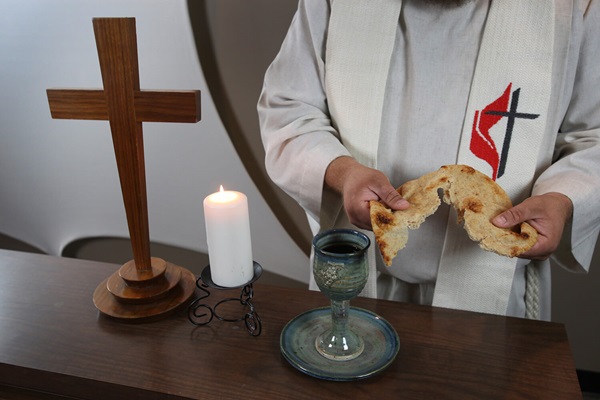Why do they say "the body of Christ, broken for you"? Was His body broken?
Someone shared a question about a term heard in a communion service, that Christ's body was "broken for you." That is not usually what is said in the United Methodist communion ritual. We do not say, "The body of Christ, BROKEN for you." We say, The body of Christ GIVEN for you."
However, there are reasons for both terms. As the Rev. Taylor Burton-Edwards explains, what is given has first been broken.
Here's why.
First, the gospels report that Jesus broke the bread before he gave it to his disciples. Referring to the broken bread, he said. "This is my body, given for you. Do this in remembrance of me." Both verbs matter in this action.
Thus we remember the action of Jesus breaking the bread in the Great Thanksgiving.
Second, and more deeply, perhaps, is the understanding of sacrifice implicit in these actions — both what Jesus was about to do himself, what Jesus was doing at that moment with his disciples, and what we are doing as we offer ourselves to God in the Great Thanksgiving in union with Christ's offering for us.
Ritually, this is how sacrifices are celebrated in the Old Testament. The priest TAKES the elements to be offered (whether grain, wine, oil or animal flesh), BLESSES God and seeks God's blessing upon them, and then BREAKS and GIVES them to those who are present for the sacrifice to consume them together.
In consuming what has been offered and blessed by God, the whole assembly is nourished by God's presence among them. Thus, when Jesus TOOK bread, BLESSED God, BROKE the bread, and GAVE it to his disciples, ritually, he was enacting a sacrifice of thanksgiving in which it was understood the bread was his body, and the cup was his blood. And when the disciples ate the bread and drank the cup, they were (and we still are!) nourished by the presence of Christ in his body and blood.
Learn more: An open table: How United Methodists understand communion
This content was produced by Ask The UMC, a ministry of United Methodist Communications.





